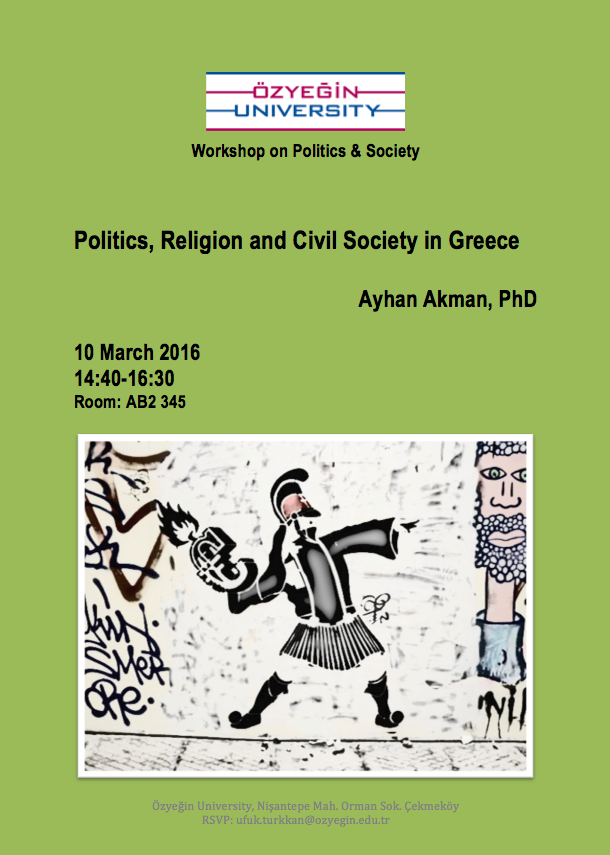Özyeğin Üniversitesi, Çekmeköy Kampüsü Nişantepe Mahallesi Orman Sokak 34794 Çekmeköy İstanbul
Telefon : +90 (216) 564 90 00
Fax : +90 (216) 564 99 99
info@ozyegin.edu.tr

Siyaset ve Toplum Çalıştayı - III
Uluslararası İlişkiler Bölümü'nün düzenlediği Siyaset ve Toplum Çalıştayları'nın üçüncüsü, 10 Mart 2016 Perşembe günü 14:40 - 16:30 saatleri arasında FEAS/AB2 345 numaralı odada, Ayhan Akman’ın "Politics, Religion and Civil Society in Greece " başlıklı çalışmasıyla gerçekleştirilecektir.
Ayhan Akman, doktora derecesini 1999 yılında University of Chicago’da Siyaset Bilimi bölümünden almıştır. Dr. Akman’ın çalışmaları kimlik siyaseti, populer kültür siyaseti, yeni sosyal hareketler, kültürün küreselleşmesi, modernleşme ve tarihsellik meseleleri ve yorumsal karşılaştırmalı siyaset üzerine yoğunlaşmaktadır.
Çalıştayın dili İngilizce'dir.
Daha detaylı bilgi almak veya katılmak için lütfen Ufuk Türkkan'la ufuk.turkkan@ozyegin.edu.tr adresinden iletişime geçiniz.
Abstract:
There seems to be two diametrically opposed, incompatible views regarding religion and civil society in Greece: One assumes that religion (and particularly the Orthodox Church) has nothing to do with civil society and leaves any consideration of its place, activity and influence outside the discussion. The opposing view (which one perhaps hears less often in public) not only sees the Church directly relevant and significant for civil society but sometimes goes even so far as to claim that it is the original, authentic civil society. In this view, the question is raised whether there is really a need for all the various associations and foundations to exist and work independently of the Church. The paper tries to understand and investigate these conflicting views of religion and civil society in Greece.
Throughout the paper’s discussion of the Greek case, the overarching aim will be to try to see what it can teach us about the intersection of religious activism and civil society in general. The Greek experience not only has potential to illuminate challenges faced by other Orthodox countries (Greece being until very recently the only Orthodox country with a liberal democratic political regime and a free market economy) but it can also provide a much needed corrective to the literature on religion/civil society nexus which, on the whole has been dominated by the experience of the Protestant and Catholic churches.
One of the leading questions of this paper is whether the overall trajectory of Orthodox Church of Greece’s view of civil society can be characterized as arch that stretches from outright hostility to suspicious aversion to ambivalent engagement and possibly positive articulation. Specifically, the paper will ask whether during the last decade and a half, Orthodox Church of Greece has initiated an era of ambivalent engagement with civil society in general and with the pluralism displayed by civil society in particular.
While the overall focus of the paper will be on the Greek case, it also tries to supply occasional comparisons to the state of civil society and religious activism in Turkey; with the hope that highlighting the similarities and differences between these two countries regarding their state traditions, strength and structure of their civil societies and the role that organized religion plays in them will be insightful and informative.
